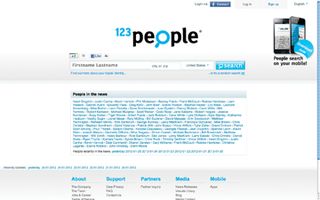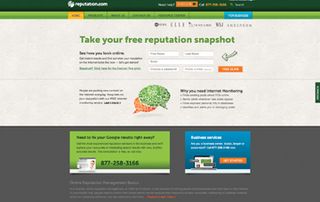Online Reputation Management: Advice, Tips, and Tools

In the always-on Internet landscape, easy access to a wide audience can be a tremendous help in building your brand. However, plans of greatness can quickly go sour once the public gets ahold of you. Though you may have a specific image of how you want yourself or business to be perceived, there’s no guarantee that this image will be widely accepted and then left alone. Others may try to tarnish the reputation you create by digging up past mistakes or by posting misleading information.
Managing an online reputation can be (and often is) a full-time job. However, with a sharp eye, careful planning and the help of some online services, you can easily handle this task.
Register multiple domain names
While deciding on a name for your company, be sure to consider the availability of a domain name that matches your business, abilities, skills or identity. You want to get a URL name as close to your company name as possible. If you’re called Synergy, you don’t want your URL to be www.thesynergybusinessonline1234.com. Bloated or misleading URL names complicate your online identity and viewers will find difficulty navigating to your website.
In the best-case scenario, you will be able to secure a domain name that begins with your company name and ends in a .com or a country-specific suffix such as .ca or .eu. Once you’ve done that, it’s also a good idea to register the .xxx version of your domain so it can’t be used against you in the future. An adult entertainment site under the same name as your lifestyle blog is definitely something you want to avoid.
Take an active role in social media
Be sure the name you wish to protect is available on such popular social-sharing sites as Facebook and Twitter. Don’t make the same mistake that Netflix did when they announced their new (and now defunct) company, Qwikster. Someone else had already claimed the Twitter handle @Qwikster (pictured) and was proudly displaying a pot-smoking Elmo in its profile photo.
Stay in the know with Laptop Mag
Get our in-depth reviews, helpful tips, great deals, and the biggest news stories delivered to your inbox.

The key is to link your social networks to your website and remain active on each network. Regular activity ensures that your users know exactly where to look for official updates and information.
If you have a personal Facebook account, don’t forget to configure your privacy settings so that only friends will be able to search your account. If you have nothing to hide, then continue to post appropriate content consistently.
Be proactive by posting your own content online
Don’t wait for someone else to post information about your company. Instead, start the conversation on your own. Posting information about yourself or your company on a regular basis will help ensure that online readers are finding content that you crafted and approved.
Having your own website is the best way to make sure people are reading accurate information before anything else that may be written about you or your company. Google favors fresh content, so make sure you post often, even if it’s just a minor update. The more you post original content, the higher up in search results you will move. As long as you are generating your own content, a Google search should display your own articles before others when your chosen name is searched.
Review your personal and professional online history

You can use 123people.com (pictured) and PeekYou.com to see what photos and videos (along with email addresses and other information) are connected to your name online. The websites display the information in an easy-to-read format with clearly labelled sections. The searches are done on a first- and last-name basis, but PeekYou also lets you search usernames. Both services are good resources to turn to, as they offer fairly comprehensive results in only a few seconds.
Monitor what people are saying about your brand
You can’t address any problems or threats to your company’s reputation if you don’t know what’s being said about you.
1. Google Alerts: Google Alerts can be your best friend. It’s simple to set up. All you have to do is visit www.google.com/alerts and fill out the required information. Just enter your search query (in this case your business name). Then choose the result type (News, Blogs, Video, Discussions, Books or Everything). Choosing Everything will yield the most complete results. From there, you can choose how often Google checks for new listings, how many results to show you (choose all of them) and what email address to use for receiving alerts. Once you’ve set up an alert for your company name, go ahead and do the same for your Twitter handle and other usernames.
2. Reputation.com: Sign up at www.reputation.com to stay informed about what is being said about you on the Internet. The website will perform an in-depth search of your or your company’s name for free. This service will also monitor your personal data on the Web and alert you whenever your search phrase is mentioned online.

One advantage to Reputation.com versus Google Alerts is the ability to rate any links to your name as either positive, negative or neutral. If a link is marked positive, Reputation.com will start promoting the link. The opposite is true if a link is marked negative. If a link is marked neutral, nothing is done.
Also included with your account is MyPrivacy, a service that searches databases that cater specifically to people in order to inform you of what personal information (addresses, phone numbers, etc.) is readily available. Reputation.com also has a paid version called ReputationDefender that offers even more comprehensive options when dealing with your online presence. The extras don’t comecheap, however, running anywhere from $129 to $699 per year. But unless you’ve got a really messy past, the free version should suffice.
Quick Tip: If you are using such services as Reputation.com and Google Alerts, be sure to search any online aliases that you use, as these will always surface and find their way back to the real you.
3. Rhino360: Start at www.reputationrhino.com to sign up for this free monitoring service. You’ll receive daily, weekly or monthly reports identifying who is talking about your keywords, where they are and what they’re saying. The service reportedly checks more than 1 million online sources including blogs, video, photo sharing sites, social networkings and discussion boards. The report, which can be sent as text, HTML or Excel files, breaks down whether the comments are positive, negative or neutral.

4. Technorati: Use www.technorati.com (a popular blog aggregator) to subscribe to searches for your business name. The site also ranks various websites in different categories so you can get a feel for how you stack up against the competition. It does take a bit of work to authenticate your website (you need to prove that you actually run it), but it’s worth the extra effort.
